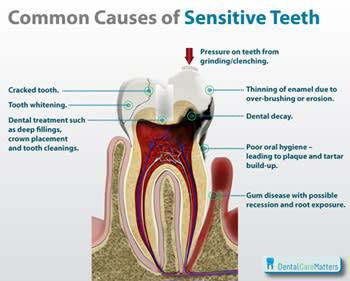
2 minute read
Ouch, that is cold!
Tooth sensitivity can be caused by many stimuli
by Dr. Eric Eby, DDS
Advertisement
Have you ever felt pain or discomfort after a drink of ice-cold water or a cup of hot coffee? Are your teeth sensitive to sweet sticky foods? Many times we associate this with a cavity. Although this is a possibility, many times it is related to “dentin (the layer of the tooth under your enamel) hypersensitivity.”
It may be a temporary or chronic problem, and it can affect one tooth, several teeth, or all the teeth in a single individual. Sensitivity can have a number of different causes, many of which are easily treated with a change in your oral hygiene regimen or help from your dental professional.
People with sensitive teeth may experience pain or discomfort as a response to certain stimuli.
Common stimuli include: 1) hot foods and cold beverages 2) cold air 3) sweet foods and beverages 4) acidic foods and beverages 5) generalized aching of many teeth in one area 6) recent treatment to tooth or gum area 7) sinus infections 8) issues related to systemic health
The symptoms of sensitivity may come and go and can be related to stress as we all clench and grind our teeth during stressful times in our life.
Some of the most common causes of sensitive teeth include broken or cracked teeth, GERD, clenching and grinding, aggressive brushing, gum recession, and worn fillings.

It is not uncommon to have sensitivity after a tooth has been repaired with a crown or filling. Patients can also experience transient sensitivity after a routine hygiene visit, in these cases the sensitivity will improve over time.
PLEASE remember your teeth have nerves and a circulatory system. They are very alive and respond to surgical treatment like all other parts of your body. Healing potential will vary depending on the health of the tooth in question. You would not expect to run a marathon after knee surgery! If you’re experiencing tooth sensitivity make an appointment with your dental professional. They can look at the health of your teeth and check for potential problems like cavities, loose fillings, or gum recession that could be causing the sensitivity.
Treatment may include topical agents, a night guard to reduce stress on teeth during nighttime grinding, surgical gum grafting, and/or fillings to cover sensitive tooth structure.
Dr. Eric L. Eby, D.D.S., M.A.G.D. His interests include crown and bridge, implant dentistry, and sleep apnea.


